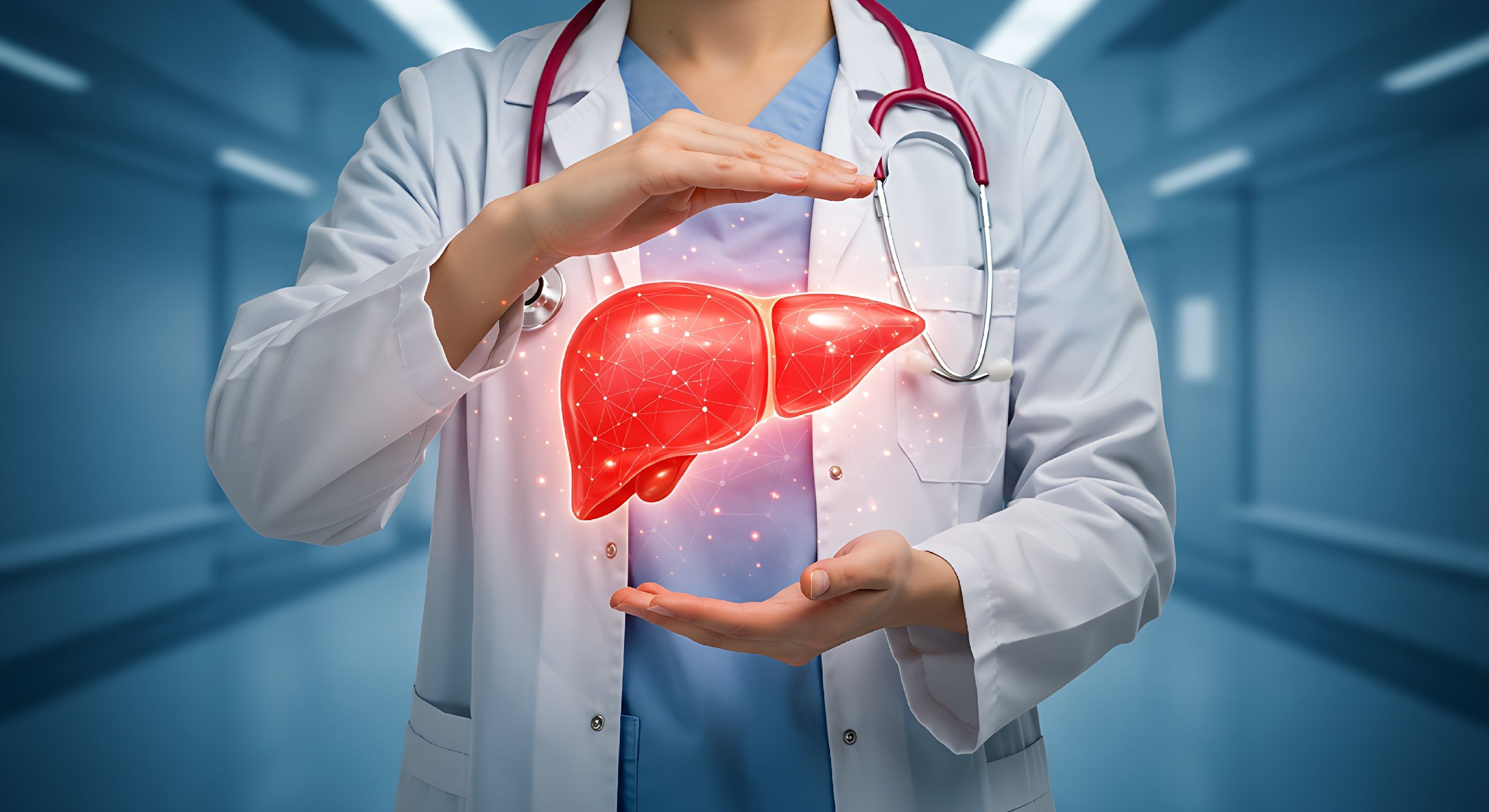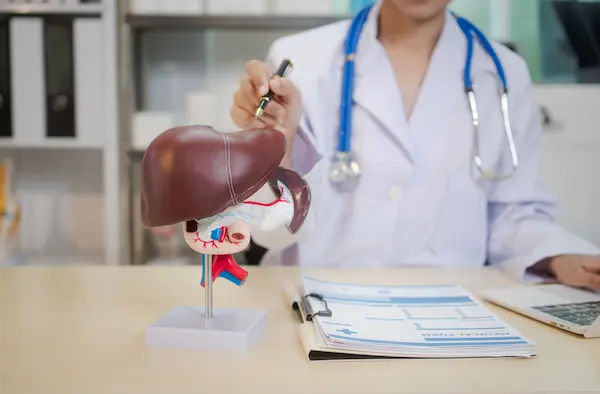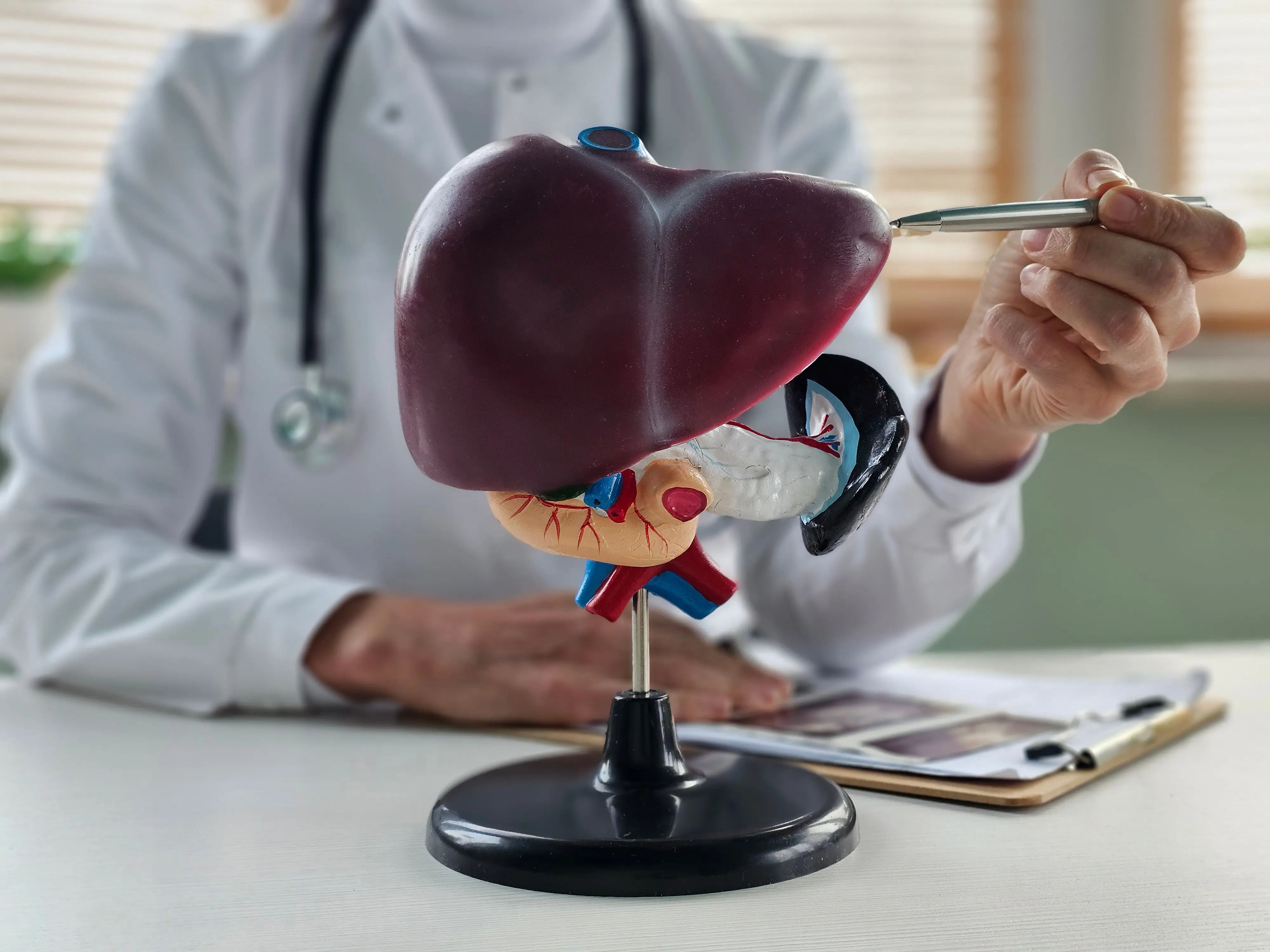Alcohol's Effect on the Liver: Understanding the Impact
Learn how excessive alcohol consumption impacts liver health, from fatty liver to cirrhosis. Understand the stages, symptoms, risk factors, and prevention strategies for alcohol-related liver disease.

Written by
Last updated on 13th Jan, 2026
Introduction
The liver is a vital organ that performs a wide range of functions necessary for maintaining overall health. It metabolises nutrients, detoxifies harmful substances, and produces essential proteins. However, excessive alcohol consumption can severely impact liver health, leading to a range of liver diseases and complications. This article explores the various effects of alcohol on the liver, the stages of alcohol-related liver disease, and ways to prevent and manage these conditions.
The Liver's Role in the Body
Before delving into the effects of alcohol on the liver, it's important to understand the liver's functions. The liver is responsible for:
Metabolising carbohydrates, proteins, and fats.
Storing vitamins and minerals.
Producing bile for digestion.
Detoxifying blood by removing harmful substances.
Producing proteins essential for blood clotting and other functions.
Given its critical roles, maintaining liver health is crucial for overall well-being.
How Alcohol Affects the Liver
When you consume alcohol, it is absorbed into the bloodstream through the stomach and small intestine. The liver is responsible for breaking down most of the alcohol in the blood through a process called oxidation. During this process, enzymes in the liver convert alcohol into water and carbon dioxide, which are then excreted from the body.
However, the liver can only process a certain amount of alcohol at a time, roughly one standard drink per hour. When you consume more alcohol than the liver can handle, the excess alcohol circulates in the bloodstream, affecting other organs and tissues.
Chronic alcohol consumption leads to several liver conditions, including the risk of developing liver cancer, particularly a type called hepatocellular carcinoma. Symptoms may include unexplained weight loss, loss of appetite, abdominal pain, nausea, vomiting, and yellowing of the skin and eyes (jaundice). Liver cancer, unfortunately, is not always reversible, especially in advanced stages. However, if caught early, treatment options such as surgery, radiation, or chemotherapy can significantly improve the chances of survival and potentially remove or shrink the cancer.
Consult Top Doctors for Your Liver Problems
Stages of Alcohol-Related Liver Disease
Knowing the stages of alcohol-related liver disease is important for understanding how drinking too much can harm your liver over time. From fatty liver to liver cancer, alcohol can cause serious damage. Here's a quick look at each stage and its effects on the liver.
1. Fatty Liver (Hepatic Steatosis)
When you drink too much alcohol, your liver can't process it all efficiently. This causes fat to build up in your liver.
Symptoms: Most people don't have symptoms, but some might feel tired, weak, or have a slight discomfort in the upper right side of their abdomen.
Reversibility: The good news is that this stage is usually reversible. If you cut down on alcohol or stop drinking, your liver can recover and get rid of the excess fat.
2. Alcoholic Hepatitis
If you keep drinking heavily, your liver can become inflamed and damaged. This stage is called alcoholic hepatitis.
Symptoms: Symptoms can be more noticeable and may include yellowing of the skin and eyes (jaundice), fever, nausea, vomiting, abdominal pain, and loss of appetite. In severe cases, it can be life-threatening.
Reversibility: Alcoholic hepatitis can sometimes be reversible if alcohol is stopped, but in severe cases, it can be fatal and lead to permanent liver damage. Therefore, seeking treatment as soon as possible is crucial.
3. Fibrosis and Cirrhosis
As alcohol-related liver disease progresses, continued damage leads to the formation of scar tissue in the liver and can eventually develop into a severe and often irreversible stage where liver function is significantly impaired.
Fibrosis:
Continued alcohol damage can cause scar tissue to form in your liver. This stage is called fibrosis.
Symptoms: Symptoms might still be mild or absent, but some people may start to feel tired and generally unwell.
Reversibility: If you stop drinking and get proper medical care, fibrosis can be partially reversible. The liver has some capacity to heal itself if given the chance.
Cirrhosis:
If the damage continues, fibrosis can progress to cirrhosis, where the liver is heavily scarred, and its function is significantly impaired.
Symptoms: Symptoms of cirrhosis can be quite pronounced and may include extreme fatigue, easy bruising and bleeding, itchy skin, yellowing of the skin and eyes (jaundice), fluid buildup in the abdomen (ascites), and confusion or cognitive problems (hepatic encephalopathy).
Critical point: Cirrhosis is generally irreversible. The damage is permanent and can lead to liver failure. At this stage, a liver transplant may be the only option for survival.
Factors Influencing Alcohol-Related Liver Damage
Several factors can affect how alcohol impacts the liver. Some people may be at higher risk of liver damage from alcohol due to their unique circumstances. Here’s a breakdown of key factors that influence alcohol-related liver damage:
Quantity and Duration of Alcohol Consumption: The more alcohol you drink and the longer you drink it, the higher your risk of liver damage. Regularly consuming large amounts of alcohol overwhelms the liver’s ability to process it, leading to significant harm over time.
Genetic Factors: Your genes can influence how your body processes alcohol. Some people have genetic variations that make them more vulnerable to liver damage from alcohol. Even if two people drink the same amount, one may be more prone to liver issues because of their genetic makeup.
Gender: Women are generally more susceptible to alcohol-related liver damage than men, even with smaller amounts of alcohol. This is due to women having lower levels of alcohol-metabolising enzymes, which means alcohol stays in their system longer and puts more strain on the liver.
Nutrition: A poor diet can worsen liver damage from alcohol. Many people who drink heavily have poor nutrition and don’t get the vitamins and minerals needed to keep their liver healthy. Malnutrition can make it harder for the liver to repair itself, increasing the risk of severe damage.
Coexisting Medical Conditions: Existing health problems like obesity, diabetes, or viral hepatitis (hepatitis B or C) can make the liver more vulnerable to alcohol. These conditions already put a strain on the liver, and drinking alcohol adds extra stress, making it more likely that serious liver damage will occur.
Age: As we age, our liver becomes less efficient at processing alcohol. Older adults are more likely to experience liver damage because the liver’s ability to regenerate decreases with age. This means alcohol has a stronger effect on the liver of older people than on younger individuals.
Lifestyle Choices: Other lifestyle habits, such as smoking or drug use, can also contribute to liver damage. These substances put additional stress on the liver, making it harder for the organ to recover from the damage caused by alcohol.
Conclusion
Alcohol has significant effects on the liver, which plays a crucial role in detoxifying the body and maintaining overall health. Excessive alcohol consumption can lead to liver diseases such as fatty liver, alcoholic hepatitis, and cirrhosis. Understanding the stages and symptoms of these conditions can help in early intervention and prevention. Factors like the amount and duration of alcohol consumption, genetics, gender, nutrition, other medical conditions, age, and lifestyle choices influence the risk of liver damage.
Consulting a healthcare professional for personalised advice is essential for anyone concerned about their liver health or alcohol consumption. Taking proactive steps today can lead to a healthier liver and a better quality of life.
Consult Top Hepatologists
Consult Top Hepatologists

Dr. E Prabhakar Sastry
General Physician/ Internal Medicine Specialist
40 Years • MD(Internal Medicine)
Manikonda Jagir
Apollo Clinic, Manikonda, Manikonda Jagir
(150+ Patients)

Dr. Aswin S. Krishna
Hepatologist
10 Years • MBBS, MD (Internal Medicine,MMC), DM (Hepatology, MMC), PDF(Fellowship in Liver Transplanatation)
Chennai
Apollo Hospitals Greams Road, Chennai
(125+ Patients)

Dr. Murugan N
Hepatologist
18 Years • MBBS, MRCPI, FRCPG
Chennai
Apollo Hospitals Greams Road, Chennai
(425+ Patients)

Dr. Aakash Garg
Gastroenterology/gi Medicine Specialist
12 Years • MBBS, DNB (Medicine), DrNB (Gastroentrology).
Bilaspur
Apollo Hospitals Seepat Road, Bilaspur
(150+ Patients)

Dr U V U Vamsidhar Reddy
Hepatologist
10 Years • MBBS, MD (JIPMER), DM (Hepatology, PGIMER)
Chennai
Apollo Hospitals Greams Road, Chennai
(75+ Patients)
Consult Top Doctors for Your Liver Problems

Dr. E Prabhakar Sastry
General Physician/ Internal Medicine Specialist
40 Years • MD(Internal Medicine)
Manikonda Jagir
Apollo Clinic, Manikonda, Manikonda Jagir
(150+ Patients)

Dr. Aswin S. Krishna
Hepatologist
10 Years • MBBS, MD (Internal Medicine,MMC), DM (Hepatology, MMC), PDF(Fellowship in Liver Transplanatation)
Chennai
Apollo Hospitals Greams Road, Chennai
(125+ Patients)

Dr. Murugan N
Hepatologist
18 Years • MBBS, MRCPI, FRCPG
Chennai
Apollo Hospitals Greams Road, Chennai
(425+ Patients)

Dr. Aakash Garg
Gastroenterology/gi Medicine Specialist
12 Years • MBBS, DNB (Medicine), DrNB (Gastroentrology).
Bilaspur
Apollo Hospitals Seepat Road, Bilaspur
(150+ Patients)

Dr U V U Vamsidhar Reddy
Hepatologist
10 Years • MBBS, MD (JIPMER), DM (Hepatology, PGIMER)
Chennai
Apollo Hospitals Greams Road, Chennai
(75+ Patients)




